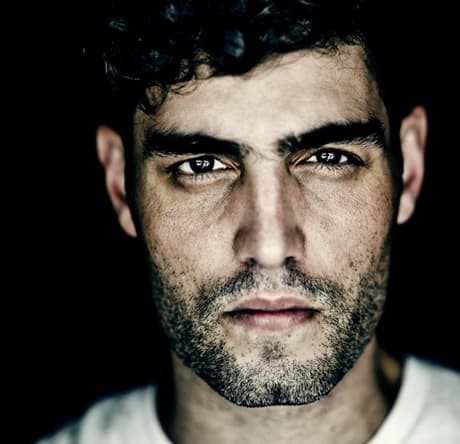Blue-collar crooner Daughn Gibson, recently plucked by Sub Pop from the trucker industry, released Me Moan this week. Bleakly majestic, his second LP is a product of lost innocence and experience, the result of a nomadic work life ranging from non-air-conditioned warehouse work to climbing broadcast towers and manning tills at an adult bookstore that Gibson says he always had planned for himself.
"I never had ambition to be one particular thing," Gibson tells Exclaim! of his off-piste career arc. "When I was 23, I thought, 'My career is to have a bunch of different jobs.' I like hoarding experiences, like people like hoarding records or comics. And they didn't have to be special; they just had to give me an understanding of another way of doing things. This wasn't conceptual in any way, like I'm doing art or I'm writing a book. It was kind of like, 'Well, I'm not gonna be really good at anything, but I can be okay at a lot of things.'"
As it turns out, he had dark talent hidden in the bank. Indeed, for all the record's musical beacons, Gibson's chilly disposition creates a barren lyrical wasteland: Me Moan, it's fair to say, is a thing of few happy endings.
"If I'm honest with myself," he begins, "and I look at people who live in what I call a cold cave, I don't think there's a lot of optimism. And I don't think there's a lot of help, and I don't think it's going to get better. And maybe the problem is that we think it is going to get better by some kind of lucky happenstance Hollywood moment. And the truth is that the chaos will continue to unfold for a lot of our lives. So I suppose you could say that at the end of each character, there probably is not a lot of hope. But the songs aren't necessarily about their downfall, it's about a moment in their chaotic life."
Any compassion is buried beneath the gravel of Gibson's voice, a stentorian croon designed to cut through the listener's emotional defences. But for all the manly signifiers, straight masculinity is far from his intention.
"I want to keep it light and airy, too," he says. "I don't want it to be punishing in a heavy metal kind of way, or a rap kind of way, where everything is relentlessly man-oriented. I don't think that I do that in my music, and if I do then I need to change it, because it's certainly not my intention to celebrate masculinity. It's nowhere near the point. The challenge for me is to have as much empathy as I can and write from different perspectives. To me, that's the fun."
Gibson is currently out on a U.S. tour, dates for which can be found here.
"I never had ambition to be one particular thing," Gibson tells Exclaim! of his off-piste career arc. "When I was 23, I thought, 'My career is to have a bunch of different jobs.' I like hoarding experiences, like people like hoarding records or comics. And they didn't have to be special; they just had to give me an understanding of another way of doing things. This wasn't conceptual in any way, like I'm doing art or I'm writing a book. It was kind of like, 'Well, I'm not gonna be really good at anything, but I can be okay at a lot of things.'"
As it turns out, he had dark talent hidden in the bank. Indeed, for all the record's musical beacons, Gibson's chilly disposition creates a barren lyrical wasteland: Me Moan, it's fair to say, is a thing of few happy endings.
"If I'm honest with myself," he begins, "and I look at people who live in what I call a cold cave, I don't think there's a lot of optimism. And I don't think there's a lot of help, and I don't think it's going to get better. And maybe the problem is that we think it is going to get better by some kind of lucky happenstance Hollywood moment. And the truth is that the chaos will continue to unfold for a lot of our lives. So I suppose you could say that at the end of each character, there probably is not a lot of hope. But the songs aren't necessarily about their downfall, it's about a moment in their chaotic life."
Any compassion is buried beneath the gravel of Gibson's voice, a stentorian croon designed to cut through the listener's emotional defences. But for all the manly signifiers, straight masculinity is far from his intention.
"I want to keep it light and airy, too," he says. "I don't want it to be punishing in a heavy metal kind of way, or a rap kind of way, where everything is relentlessly man-oriented. I don't think that I do that in my music, and if I do then I need to change it, because it's certainly not my intention to celebrate masculinity. It's nowhere near the point. The challenge for me is to have as much empathy as I can and write from different perspectives. To me, that's the fun."
Gibson is currently out on a U.S. tour, dates for which can be found here.




